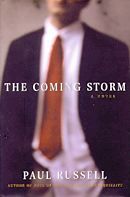|
|
||||||||
| Excerpts: | ||||||||
|
||||||||
| An Interview with the Author |

![]()

 From Chapter
2
From Chapter
2
The Coming Storm
By Paul Russell
[Claire
ponders Tracy, Louis, the past and the present.]
She brought in the dessert dishes and espresso cups to where her husband stood at the sink. He'd taken off his sports jacket, rolled up his shirtsleeves. Washing dishes was one of the few domestic chores he professed to enjoy. After an evening of animated conversation, it allowed him to sort things out.
"The eggplant lasagna was very good," he said, scraping the soggy remains of that culinary adventure into the compost bucket she kept for the garden. In honor of their guest she'd set out her mother's willowware, but Tracy hadn't seemed to notice. Louis slipped the fragile plates into soapy water. "Very good," he repeated. "But I wouldn't want to live in Tracy's meatless world. That's what worries me about these idealistic young people: the lives they long for are so depressingly insipid. Just because you pretend the universe doesn't have teeth doesn't meant you won't get eaten in the end."
"They're frightened," Claire said. "It's a very frightening world out there."
Louis shook his head grimly and wiped a plate clean with his sponge.
"But the evening wasn't a bad one, was it?" she asked him.
"Not at all," he said. "I have to confess, I rather like our young man. Even if he is a bit too eager to make a good impression."
"Our proselyte," she teased. "I think we intimidate him. I think he's trying to live up to us."
She wondered if the magnificent music from Daphne was running through Louis's head as it was through hers. Perhaps it had not been a bad place to start after all: the hapless nymph turned so gently and ravishingly into a laurel, the music obscuring her voice as leaves and branches and roots thrillingly overtook her human limbs.
But what had Tracy carried away? He'd listened politely, though, it seemed, uncomprehendingly. The language was simply beyond him. She was disappointed; after secretly rooting for him all evening, at evening's close it was with her husband that she once again found herself standing.
"I can finish these up," Louis told her, "if you want to go on to bed. I'll be up in a bit."
His sleeplessness -- or perhaps it should be called wakefulness -- no longer unnerved her, though for years she'd felt it as a kind of abandonment. She knew now: sleep made him feel too vulnerable, this man who worked so hard every waking moment to compose himself.
In the hallway the red light on the answering machine blinked mutely. A message had come through, presumably while the three of them had been awash in the music of transformation: Louis was meticulous about shutting off the telephone ringer whenever he listened to music. She turned up the volume and touched the Play button.
"Just calling to say good night. Perhaps you're out. I'll talk to you tomorrow. Or call me if it's not too late."
Libby's voice sounded tired but calm. "Too late" simply meant, Whenever you get in. Libby was like Louis in that respect, though different shadows peopled her night, a disconcerting confusion of self that deranged at times the very foundations. Libby's night was a time for flinging oneself against walls, or calling out from upstairs windows to the black sky overhead. There had been messages sent out from that abyss. There would be, Claire was sure, such messages again. But for now Libby seemed to live, however precariously, in the midst of some reprieve.
Upstairs, in their bedroom, she closed the window she'd opened earlier to the afternoon's warm sun. Would Louis remember to shut the windows downstairs? The chill never bothered him as it did her. She thought to call down, but decided against it. There was always that moment in their evenings when, even though they occupied the same bed, they went their separate ways.
Once, she remembered as she undid the brooch at her collar, a call had come through at four in the morning, Libby's voice childlike and sounding very far away, as if from some icy planet circling a fierce dwarf of a star: "Claire, honey, I've decided I'm going to kill myself."
She opened the little mahogany box where she kept the few pieces of jewelry she allowed herself -- mostly old, mostly her mother's -- and laid the brooch thoughtfully to rest. She slipped off her blouse, inspected it for blemishes, and, finding none, hung it in the closet. She unfastened her bra.
Libby, when she had found her in that immense folly of a house her husband had built her, was dancing alone and naked in an unused upstairs room. Claire had always feared unfurnished rooms, deserted streets, the long summers after school let out; bad things, she knew, happened in empty places. A marvelous night for a moondance, Libby sang along with the tape player balanced on a windowsill. She shook her bare, wide-nippled breast. The sunken scar of her shorn other, nearly two years gone, shone whitish. Her body had grown thick and fleshy, as if her brush with death had made her hungry for life.
On the floor before her, on a single sheet of white typing paper, fifteen or twenty blue pills had been neatly laid out. A tall glass of water caught the light.
Louis had waited downstairs. He wouldn't come up. You friend reminds me of Medusa, he'd once teased her on a night, when they had lain together after a rare, disarranging bit of love. Now she could sense him moving about anxiously downstairs. She knew she depended on him absolutely, clung to the slender lifeline his pacing spooled out for her as she lowered herself into the dark well, hand outstretched, to pull to safety her drowning comrade.
She had always imagined, as she stepped into her nightgown, that they would somehow drown together, she and Libby. Instead they had grown old. Their nights grew longer. She imagined tendrils growing from her fingertips, her toes. To become something entirely other than what one was. By no means was Daphne Strauss's best opera, but even the least of his scores was a world that could be lived in. Perhaps that was where she took her comfort -- in how he filled out the emptiness, peopled it so lushly with notes.
Downstairs Louis was farting. He did that, loudly, when he thought no one could hear. It spoke volumes about the life he led, the ways he hemmed himself in. Tonight he'd reminisced about Jack Emmerich. It was as if one small bit of flotsam had floated up from a submerged wreck. What was Louis like in the privacy of his soul, where no one could hear or see? She wasn't sure she'd recognize him, if ever she were to glimpse that other self who was not, and had never been, her husband. And which was more real, that reserved, courtly, and difficult man she had lived with for forty years, or the unrevealed, sequestered Louis, his farts and shouts never to be visited by anyone? For she was certain that that other life existed; its details might remain hidden, but not the fact of its secret flourishing.
She went to the bureau and touched, as she did every night before going to bed, the framed photos of Susan, of Caroline. She had said to them, You must exist. She had sent them recklessly out into the world, hapless emissaries of her sometimes couplings with this man. What truths of their father did they carry? Or, for that matter, of their mother as well? For she had her own share of secret flourishings no one need know about.
Moonlight streamed in the open window she'd shut against the chill. September was marching to an end. Soon she'd switch to flannel. She'd be putting extra blankets on the bed. From the woods behind the house an owl hooted: somewhere on the Forget Schools' campus that solitary and nocturnal creature managed to survive. Downstairs, Louis farted again.
She hadn't forgotten the gray cat. Had only pushed it to the back of her mind, where it lurked as hopelessly as it had in its cage at the pound. How long, she wondered, would they keep it there before putting it down? Putting it to sleep, as the euphemism went. If she went back tomorrow...but she knew, stretching out her limbs under the quilt, the cool smooth sheets, she never would. She supposed they did it by lethal injection, though she really didn't know. Somewhere she had read that impounded animals went on to medical experiments. They had their spines broken, or were infected with lethal agents. Science probed their mysteries in the hopes of bettering the world -- or at least of prolonging human life, which was supposed to amount to the same thing.
She had helped Tracy Parker acquire a dog. She had looked a doomed cat in the eye and looked away. S he could not bear to contemplate the visit they'd have to make to the vet one day soon with Lux. All this management of life and death. And there was Libby to think about too.
Sleep had always, blessedly, come to her instantly. Sleep was welcoming arms; sleep was the dark cave. Desire for oblivion. She did not fear to name it -- and named, it didn't particularly threaten her. It was simply what she lived with, as she lived with any number of things. That daily reprieve from life that guaranteed her life. Everyone made a pact with something or someone. No one escaped. Claire had never considered herself an exception to anything.
Copyright ©
1999 Paul Russell.
 Back
to the Stonewall Inn
Back
to the Stonewall Inn
